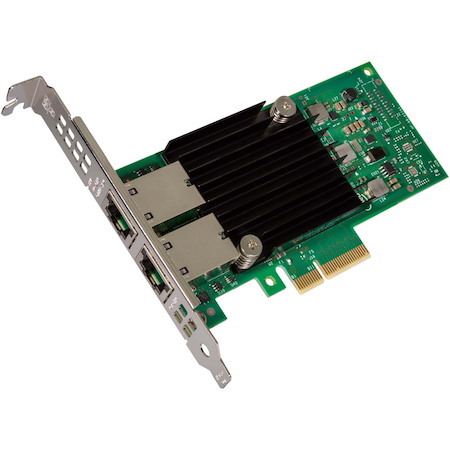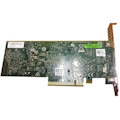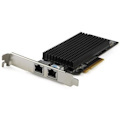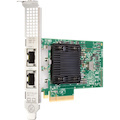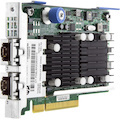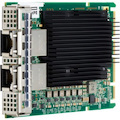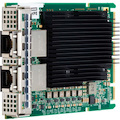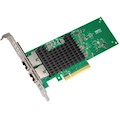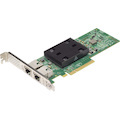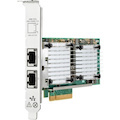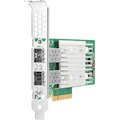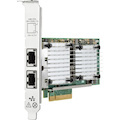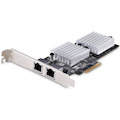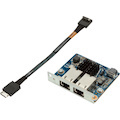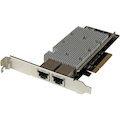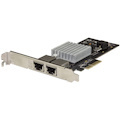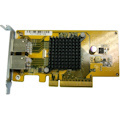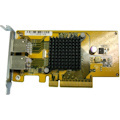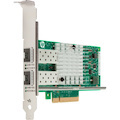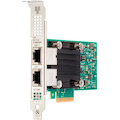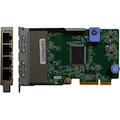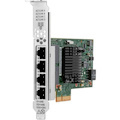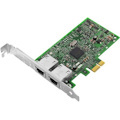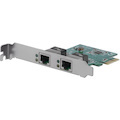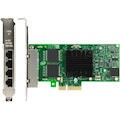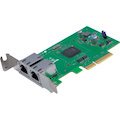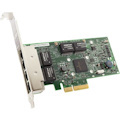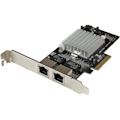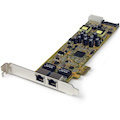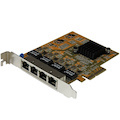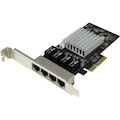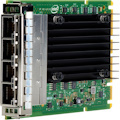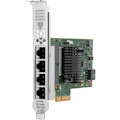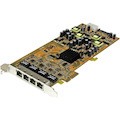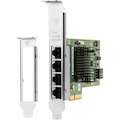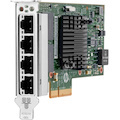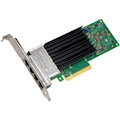- General Information
- Manufacturer
- Intel Corporation
- Manufacturer Website Address
- http://www.intel.com/
- Brand Name
- Intel
- Product Series
- X550
- Packaged Quantity
- 1
- Product Type
- 10Gigabit Ethernet Card
Autonegotiation between 1GbE, 2.5GbE, 5GbE, and 10GbE provides the necessary backwards compatibility required for a smooth transition and easy migration to 10GbE.
The X550 is a low-cost option for deploying 10GbE in your data center because it uses CAT6 and CAT6A cabling - standard cabling for many data centers. Copper cabling's flexible reach from 1 meter to 100 meters also supports Top of Rack (ToR), Middle of Row (MoR), and End of Row (EoR) network architectures.
This adapter also reduces cost and power through its single-chip solution. The adapter uses the Intel® Ethernet Controller X550, with integrated MAC and PHY. Integration translates to lower power and means no more active heatsink reducing the per-port power consumption.
Integration also equals lower cost per port. When cabling is accounted for, cost efficiencies realized from a single 10GBASE-T adapter means that this is possibly the lowest-cost media to deploy. When time and budget allow, 10GBASE-T switches can be added to experience the full benefits of 10GbE.
Virtualization
Virtualization changes the way server resources are deployed and managed by running multiple applications and operating systems independently on a single server. The X550 includes Intel® Virtualization Technology for connectivity (Intel® VT-c) to deliver I/O virtualization and Quality of Service (QoS) features.
I/O virtualization advances network connectivity used in today's servers to more efficient models by providing FPP, multiple Tx/Rx queues, Tx queue rate-limiting, and on-controller QoS functionality, useful for both virtual and non-virtual server deployments.
The X550 reduces I/O bottlenecks by providing intelligent offload of networking traffic per VM, enabling near-native performance and VM scalability. The host-based virtualization technologies include:
- VMDq for emulated path: Adapter-based VM queue sorting enabling efficient hypervisor-based switching.
- SR-IOV for direct assignment: Adapter-based isolation and switching for various virtual station instances enabling optimal CPU usage in virtualized environment.
Additionally, this adapter family provides virtual bridging support that delivers both host-side and switch-side control and management of virtualized I/O as well as the following modes of virtualized operation:
- VEPA: IEEE 802.1Qbg support for Virtual Ethernet Port Aggregator.
- VEB: Virtual Ethernet Bridge support with Intel VT.
Networking Virtualization
Network virtualization is the next big trend in creating an agile data center.
- VxLAN and NVGRE offloads: These stateless offloads preserve application performance for overlay networks. With these offloads, it is possible to distribute network traffic across a CPU core.
- Preserves application performance in network virtualized environment.
- Technical Information
- Chipset Manufacturer
- Intel
- Chipset Model
- X550
- Features
- Plug and Play
- Interfaces/Ports
- Host Interface
- PCI Express 3.0 x16
- Total Number of Ports
- 2
- Number of Network (RJ-45) Ports
- 2
- Media & Performance
- Media Type Supported
- Twisted Pair
- Maximum Data Transfer Rate
- 10 Gbit/s
- Network & Communication
- Network Technology
- 10GBase-T
- Physical Characteristics
- Form Factor
- Plug-in Card
- Bracket Height
- Full-height/Low-profile
- Miscellaneous
- Application/Usage
- Network
- Data Center
- Device Supported
- Server

